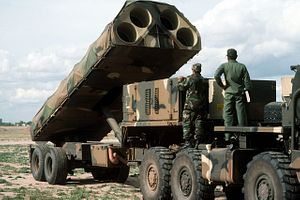Australia said this week that its territory will not be used as a base for land-launched mid-range missiles previously banned under the 1987 Intermediate-Range Nuclear Forces (INF) Treaty, while South Korea stated that is has no plans to discuss the deployment of such missiles with the U.S. on its soil.
Australian Defense Minister Linda Reynolds, following a meeting with her U.S. counterpart, U.S. Defense Secretary Mark Esper, said that the United States did not make a request to base missiles on Australian soil.
“I asked him directly, ‘Was there any expectation of a request,’ and he said, ‘No,’” Reynolds was quoted as saying by The Associated Press citing an interview on Australian radio following bilateral talks with Esper.
Australian Prime Minister Scott Morrison confirmed Reynold’s account to reporters yesterday: “It’s not been asked of us, not being considered, not been put to us. I think I can rule a line under that.”
The INF treaty banned an entire class of U.S. and Soviet ground-launched ballistic and cruise missiles with ranges of 500 to 5,500 kilometers.
Esper, who is on a weeklong Pacific tour — his first trip as defense secretary — to discuss alliance issues with U.S. allies and partners in the region, told reporters over the weekend that the U.S. “sooner rather later” wants to develop and deploy ground-launched conventionally-armed mid-range missiles.
Esper is slated to meet South Korean Defense Minister Jeong Kyeong-doo for talks on Friday in Seoul. According to a South Korean defense ministry spokesperson, however, there are no plans to discuss the deployment of U.S. missiles on South Korean territory.
“Our government did not have any official discussions with the U.S. on the possible introduction of intermediate missiles (on South Korean soil). We have not internally reviewed the issue and have no plan to do so,” defense ministry spokesperson Choi Hyun-soo was quoted as saying by Yonhap news agency.
“As of now, I believe that (the matter) is not among agenda items for the upcoming defense ministers’ talks,” she added.
The statement of the South Korean defense ministry prior to meeting the U.S. defense secretary is indicative of the difficulty the U.S. will have convincing allies to agree to host conventional ground-launched mid-range missiles on their territory.
There is no indication that the U.S. has considered basing these new missiles in South Korea: A deployment would have a highly destabilizing impact on its nuclear deterrence relationship with North Korea. Basing the missiles in Japan, where it would be met by stiff public opposition, or on the U.S. island of Guam would also most certainly lead to an escalation of tensions in the region.
China has already warned the U.S. against moving forward with plans to deploy the missiles to the region earlier this week. “China will not stand idly by and will be forced to take countermeasures should the US deploy intermediate-range ground-based missiles in this part of the world,” said Fu Cong, director of the Chinese Foreign Ministry’s arms control department, according to Deutsche Welle.
Fu urged Australia, Japan and South Korea to “exercise prudence and not to allow a US deployment of its intermediate-range missiles on (their) territory.”

































